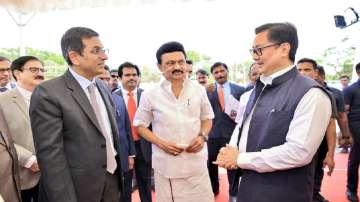Amid the friction between the Centre and the Judiciary, the law minister asserted that there is no such case between the duo as projected in the media and added it is a base of a healthy democracy.
"We have differences, but it doesn't mean there is confrontation. It sends a wrong message across the world. I want to make it clear that there is no problem between different organs of the State. There are signs of robust democratic actions, which are not a crisis," Minister Kiren Rijiju said while inaugurating the Chief Judicial Magistrate court, Mayiladuthurai on Saturday.
The event was attended by Chief Justice of India Justice DY Chandrachud, Tamil Nadu Chief Minister MK Stalin and Acting Chief Justice of Madras High Court Justice T Raja in Madurai.
Why this uproar?
The critical remarks from Minister Kiren Rijiju came nearly two days after the CJI Chandrachud, during a television conference, rejected the Centre's claim about the Indian Collegium System and said it is the best system to appoint the judges of the Supreme Court. Earlier this week, the Supreme Court Collegium voiced concern over the Centre withholding or overlooking the names recommended for appointment as judges, saying this disturbs the seniority of the candidates, and asked the government to take "necessary action" for the elevation of those recommended earlier.
Pointing to some media reports of alleged differences between the government and the Supreme Court or the legislature and judiciary, the Union Minister said, "we must understand that we are in a democracy. There are bound to be certain differences in terms of some outlooks but you can't have conflicting positions. This doesn't mean confrontation. We are the largest democracy in the world."
The Centre would support the Indian judiciary to be independent, he said and called upon the bench and the bar -- being two sides of the same coin -- to work together to ensure that the court complex is not divided.
"One can't exist without the court"
"One can't exist without the other. A court must have proper decorum and a conducive atmosphere." Talking about fund allocations, he said last year the government had allotted ₹ 9,000 crores for district and other courts in the State, and his department was pushing hard for the utilisation of funds so that more could be sought. "In some States, I realised that requirement of court and understanding of government has some shortcomings," Mr Rijiju said.
"The government would like the Indian judiciary to go completely paperless in the near future. "With the coming of technological support, everything can be synchronised so that the judge will not have to postpone cases for want of evidence, or bunch cases and other issues. Works are under process and I could sense we are going towards a major solution (for pendency)," he said.
It is worth mentioning in the past four months, the government and the Judicial system confronted each other where the latter raised questions about the judges and the process by which they were appointed. Earlier this week, the law minister even charged some retired SC judges of acting like "Opposition leaders".
(With inputs from agency)
Also Read: Supreme Court Collegium raises concern over Centre overlooking names recommended for judges' appointment
Latest India News
